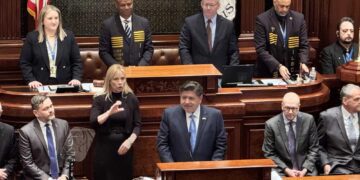SPRINGFIELD – Controversy about Exelon's plan before the General Assembly that the company says would save the Clinton and Quad Cities nuclear plants is hitting fever pitch in the days before an expected vote. The Chicagoland Chamber of Commerce and the Illinois Retail Merchants Association support Exelon's proposal, while the Technology & Manufacturing Association and Americans for Prosperity-IL's oppose it.
State Rep. Jeanne Ives (R-Wheaton) raised her opposition to Senate Bill 2814 Monday, writing on her Facebook page, "I will be voting no on this legislation…." and proceeded to point out what she sees as "a few of the problems with the bill:"
- This bill hinges on faulty science that buys into climate change alarmism despite the debunking of the IPCC findings and the recognition of the “Great Pause” – 18 years of no global warming from 1997-2015.
- This bill requires ratepayers to fund crony capitalism of huge profitable companies and favored green energy companies. Exelon net income was $2.25 billion in 2015.
- This bill is BIG Government saying all ratepayers must pay an additional $1 billion so ComEd can buy insulation and light bulbs for folks in the name of energy efficiency.
- This bill rejects Illinois’ competitive advantage in coal. Coal accounts for over 40% of Illinois energy production. You need 600 square miles of wind power to equal the same amount of energy from one coal plant.
- This bill makes Illinois ratepayers subsidize the production of nuclear energy when much of that energy does not stay in Illinois but is instead transported across state lines. Over 40% of the energy we produce is excess of our needs and then distributed across state lines.
- This bill protects certain classes of workers in Illinois when all industries should receive the same treatment.
- This bill disregards the movement away from wind and solar that is happening in Europe because you cannot run a modern economy on dilute and intermittent energy like wind and solar.
- This bill, in direct contravention of its intentions, will require more fossil fuel, not less, as back up energy sources if wind and solar are forced to become a larger portion of our energy mix.







